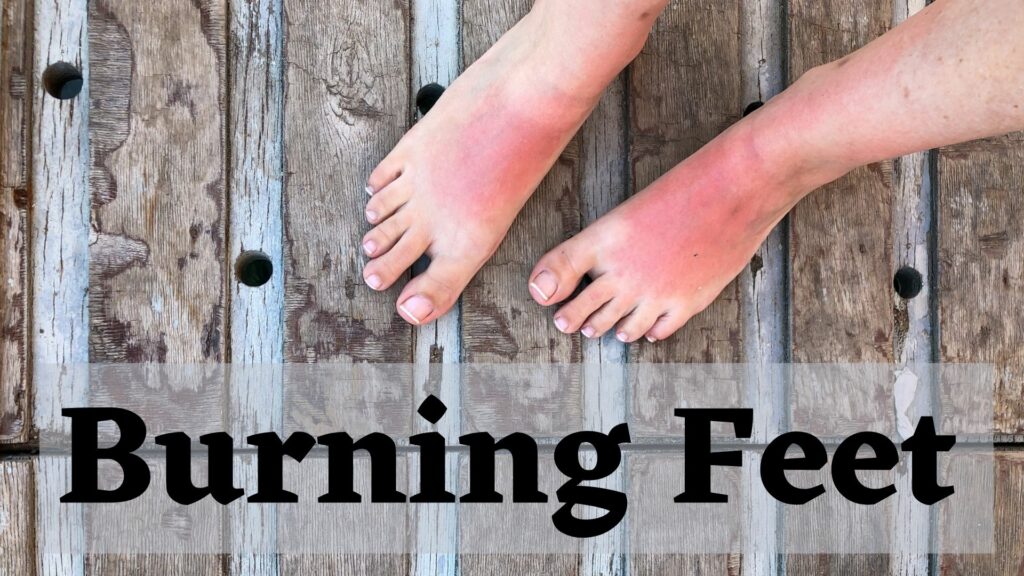You might not think that feet problems are serious. You might even try to ignore it. But don’t make the mistake of thinking that burning feet is not a big deal. Burning feet can be caused by many different things, like diabetes or nerve damage. Some people have pain in their feet, but it goes away. Other people have more pain and they can get bad conditions if they do not get help for the pain. This article discusses what causes burning feet and how you can manage them at home with simple remedies!
Contents
What is Burning Feet?
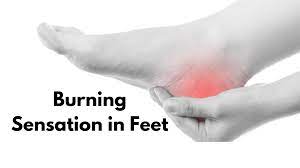
Burning feet is a medical term used to describe the feeling of pain in your foot. You may also have blisters or sweat. It feels like your feet are on fire, but it’s because you have been walking a long time. You can stop the burning if you take off your shoes and walk around for a little bit. Some people have feet that burn. There are some studies that say one-third of the population has this happen some time or another. Sometimes people can get hurt when they are walking. It happens to people of any age and either gender equally, but women say it more than men do.
Symptoms of Burning Feet
The symptoms of burning feet include:
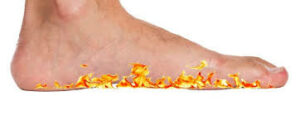
- Intense and disagreeable heat in the soles or toes: People with heat sensitivity are more sensitive to the heat than people who are not. It can be so hot that they have to take their shoes off because it is so uncomfortable.
- Severe stinging pain: The discomfort may range from mild aches over a prolonged period to sharp stabs right away when walking on certain surfaces such as cobblestones. In some cases, the pain may be accompanied by swelling and even blisters.
- Burning feet in combination with sweaty or clammy skin: Sweating is a common response to overheated conditions such as when wearing new shoes that are too tight for comfort. However, if you feel that your feet are cold when you walk on the floor without shoes, then there is something wrong.
- Burning feet in combination with redness and itchiness: Symptoms such as blisters, swelling, or skin discoloration combined with intense itching make it essential to see your doctor right away if you suspect that something is wrong.
- Swelling or puffiness in one or both feet: In some cases, the affected area may be so swollen that walking becomes difficult. In rarer but more severe cases an infection could lead to a low-grade fever as well as chills and even sepsis if not treated in time.
- Blisters, lesions, and cracks on the skin of your toes and soles: If you notice these symptoms then it is important to get in touch with your doctor before the condition worsens.
These are all the symptoms of burning feet that you must know.
40 Causes of Burning Feet
There are multiple possible causes for burning feet. Some people have to worry about things that are medical-related. People may have certain shoes that are too tight or walk on hot surfaces in the summer.
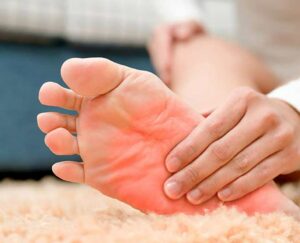
- Chronic kidney disease (uremia): If you have been diagnosed with chronic kidney disease or uremia then your feet may start to feel hot and burn whenever they get wet such as when taking a shower.
- Heart problems: Heart failure, heart attack, and even cardiac arrest can cause the soles of your feet to feel like they are burning due to poor blood circulation.
- Small fiber neuropathy: This occurs when your nerve cells are damaged and it may result in a burning sensation as well as other symptoms such as tingling, numbness, or weakness.
- Diabetes: Another possible cause of burning feet is diabetes due to the damage that high blood sugar levels wreak on tiny blood vessels all over your body. As a result, you may also experience impaired vision and extreme thirst.
- Peripheral arterial disease (PAD): If your feet burn when walking due to PAD then you must make sure to act on the problem right away as it can lead to more severe issues such as skin ulcers, gangrene, or even amputation of toes or entire foot if left untreated.
- Vitamin deficiency (vitamin B12, folate, and occasionally vitamin B6): B12 deficiency is a common cause of burning feet and it may result in other symptoms such as numbness or tingling.
- Alcohol abuse: Alcohol abuse is another possible cause of burning feet. If you drink too much alcohol, then your liver can’t make enough albumin. Albumin carries vitamins so it is important to have enough. If you don’t have enough albumin, then your body may become deficient in vitamin B12 and cause this symptom to happen.
- Excessive consumption of hot beverages: Drinking very hot tea, coffee, or any other drink that has a high temperature can cause a burning sensation in the mouth and throat which then spreads to your feet.
- Extremely hot weather conditions: Walking barefoot on excessively hot surfaces such as asphalt or concrete during extremely hot summer days may result in burns that lead to discomfort, swelling, pain, blisters, etc.
- Exposure to certain chemicals (laundry detergents, dry cleaning chemicals, etc.): Your feet may feel hot and burn whenever they come into contact with specific household or workplace chemicals.
- Exposure to certain plants (poison ivy, oak, sumac): You can also develop an allergic reaction to some types of poisonous plants that cause burning sensations throughout the affected area as well as other symptoms such as blisters, nausea, and vomiting.
- Low thyroid hormone levels (hypothyroidism): If you suffer from a thyroid disorder then your feet may feel hot and burn. It is important to get in touch with your doctor so they can help you. They will monitor your condition and give you medicine if they need to.
- Lyme disease: If you have been diagnosed with Lyme disease then your feet may start to feel hot and burn. This is an infection. It can affect many different parts of your body, such as your heart, brain, muscles, and joints.
- HIV/AIDS: People who suffer from HIV/AIDS may start to feel as if their feet are burning and the sensation tends to worsen over time.
- Blistering skin diseases (pemphigus Vulgaris, pemphigoid, epidermolysis bullosa): If you have one of these blistering skin conditions then your hands, feet, or any other area of your skin may start to burn.
- Gout: Gout occurs when excess uric acid forms crystals in the joints causing redness and swelling which results in a burning sensation around the affected areas such as toes, heels, ankles, etc.
- Liver failure (hepatitis): If you have hepatitis then you may experience a burning sensation in your legs and feet.
- Multiple sclerosis: People with multiple sclerosis tend to develop pain, numbness, tingling, stiffness, and other symptoms that can lead to the feeling of burning throughout their hands or feet.
- Parkinson’s disease: If you have Parkinson’s then your nerve cells are gradually deteriorating leading to impaired muscle control, tremors, and stiffness which can lead to the sensation of burning feet.
- Rheumatoid arthritis: If you have rheumatoid arthritis then your joints become inflamed causing pain all over the body including in hands or feet resulting in a feeling of heat or even burning when it is at its worst.
- Amyloid polyneuropathy: This is a rare condition that affects the nerves and can lead to burning feet.
- Smoking: Smoking cigarettes may cause you to feel as if your feet are on fire due to carbon monoxide present in cigarette smoke which limits oxygen levels throughout the body including in hands or feet resulting in this uncomfortable sensation.
- Scleroderma: If you suffer from scleroderma then your connective tissues and collagen will start to harden inside the body which can affect blood vessels, skin tissue, muscles among other things resulting in a burning sensation.
- Systemic sclerosis: If you have systemic sclerosis then there is scarring of the small blood vessels throughout the body including those that supply oxygen to hands and feet.
- Polyarteritis nodosa: If you have this inflammatory condition then there is inflammation of the walls that surround certain arteries throughout your body including in your hands or feet which can result in a burning sensation.
- Sarcoidosis: Sarcoidosis causes lipids to form deposits inside organs such as lungs, liver, lymph nodes among others which can lead to swelling and irritation resulting in a burning sensation all over the body.
- Amyloidosis: This is a rare condition that occurs when abnormal protein deposits accumulate inside organs such as kidneys, gallbladder, heart, or even skin tissue throughout the body including hands or feet causing them to burn.
- Drug side effects, including chemotherapy drugs, vitamin B6 overdose, HIV medicines, amiodarone, isoniazid, metformin, and others: Several drugs can cause burning feet or hands as a side effect including chemotherapy medications, vitamin B-12 supplements, HIV medicines such as efavirenz and nevirapine, amiodarone commonly used to treat cardiac arrhythmias among other things.
- Fluoride toxicity: Fluoride toxicity is rare but can occur if you are exposed to too much fluoride over some time.
- Erythromelalgia: This condition is characterized by redness, swelling in the feet, and heat.
- Gangrene: If you have gangrene then there is a lack of blood flow to certain areas in your body including hands or feet which can result in tissue death resulting in this burning sensation.
- Multiple organ failure (sepsis): People who are suffering from multiple organ failure can have this burning sensation in their hands or feet.
- Heavy metal poisoning (lead, mercury, arsenic): If you have been exposed to high levels of heavy metals such as mercury, arsenic, or lead then you may experience a burning sensation in your hands and feet.
- Stroke: If you’ve had a stroke then there has been damage caused to certain parts of the brain which can result in this burning feeling all over the body including hands and feet.
- Vasculitis (inflammation of blood vessels): This condition can be caused by several diseases and is characterized by inflammation in the blood vessels including those that supply oxygen to hands and feet.
- Guillain-Barre syndrome (GBS): GBS is a rare disorder in which the immune system attacks the nerves throughout your body including your hands and feet.
- Chronic inflammatory demyelinating polyneuropathy (CIDP): CIDP is a type of chronic inflammatory demyelinating polyneuropathy disorder characterized by damage to the myelin sheath around the nerves that can cause this burning sensation.
- Reflex sympathetic dystrophy: If you have reflex sympathetic dystrophy then there is dysfunction in certain parts of your brain and spinal cord that control blood pressure and temperature which can result in this burning sensation.
- Nerve entrapment: If you have a pinched nerve from years of repetitive motion then there is pressure on the nerves that supply blood to your hands or feet resulting in this uncomfortable feeling.
- Shingles (herpes zoster): Shingles are caused by the reactivation of the varicella-zoster virus and can result in this burning sensation.
Diagnosis of Burning Feet
Burning feet can be diagnosed through a physical exam, blood tests, or imaging studies.
Physical Exam
During a physical exam, your doctor will ask you about any other symptoms that you might be experiencing.
They will also perform a thorough review of your medical history, medications you are taking, and family history.
Blood Tests
If your doctor suspects an underlying health condition, he/she may order blood tests to help diagnose the problem.
For example, they can determine if you have diabetes or elevated blood sugar levels which is associated with burning feet.
Imaging Studies
If you have a lack of circulation in certain parts of your body then you might need to get an imaging test. This can be done with an MRI or a CT scan. These tests will rule out problems that might be causing this feeling.
Other imaging studies such as ultrasound can also be used to diagnose this problem.
Treatment of Burning Feet
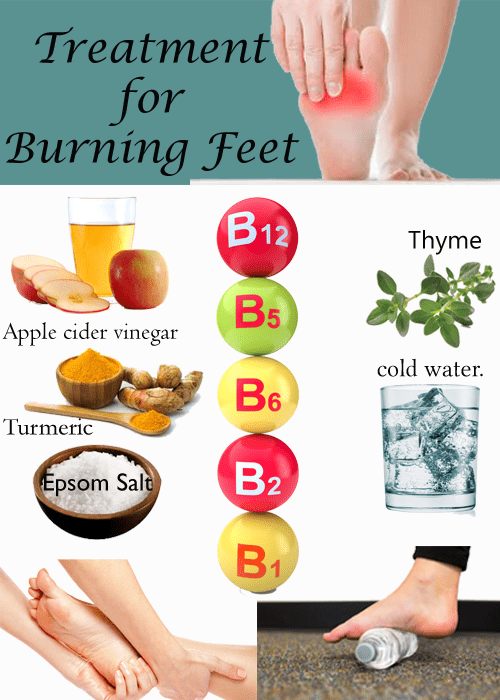
You can treat burning feet in numerous ways. All of them have been explained below:
Medications
Often, people prefer to treat burning feet with over-the-counter medications such as aspirin, acetaminophen, or ibuprofen.
If the cause of your burning feet is an underlying health condition then the treatment with alter accordingly.
For example, if you have diabetes, you can try to do things that will help make your feet feel better. If you don’t, it might hurt a lot.
If you have burning feet, it could be because of nerve entrapment. This can be treated with medication or an injection which reduces inflammation around the nerves causing this sensation.
Physical Therapy
If you have not been able to manage your pain with over-the-counter drugs, then your doctor might give you medicine that will help.
This can help to reduce the pain and inflammation around the nerves which in turn, reduces burning feet.
Surgery
If your treatments with medications and physical therapy are not working then surgery might be an option. Surgery is necessary if you have a disease that cannot one can’t manage with non-invasive treatments.
The main objective of surgery is to decompress the nerves which reduces nerve pressure and inflammation.
Home Remedies
There are steps you can take at home that may help with burning feet. Bring down inflammation in your body by taking a warm shower. You can also soak your foot in cold water or take pain relievers like ibuprofen.
Soaking feet in cold water or an ice bath

If you have burning feet, put your feet in cold water. But if you have an injury on your foot, do not put it in cold water. This can make the injury worse and cause more pain.
Rest, ice, compression, and elevation (RICE)
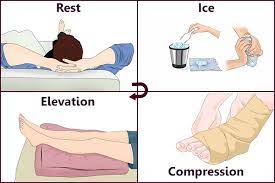
Rest by avoiding any physical activity that causes pain such as running or walking excessively; ice packs that reduce blood flow and relieve pain; compression wrap placed around the ankles that reduces blood flow and inflammation; elevation of the legs above the level of your heart.
You can manage burning feet at home. You do not need to see a doctor or spend money on medications.
Epsom salt
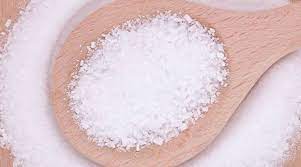
Epsom salt is a common home remedy that you can use to ease the symptoms of burning feet. It has natural anti-inflammatory properties which help reduce pain and inflammation associated with this condition.
Add Epsom salt in a bathtub with warm water. Soak your feet for about 15 minutes or until all the crystals dissolve. Be careful not to get any of the salt in your eyes.
You can put Epsom salt in warm water. Then you can put the Epsom salt on your skin or around the areas that could be causing you to feel this sensation.
This will help relieve pain, burning, and tingling by reducing inflammation associated with these symptoms.
Apple cider vinegar

Apple cider vinegar is another home remedy that can help reduce burning feet.
It has antiseptic and anti-inflammatory properties which are beneficial to the skin on your feet. Apple cider vinegar also has alpha-hydroxy acids which are good for the skin. If you put it in warm water, it can make your skin softer. You can take a bath with apple cider vinegar and soak your feet for about 20 minutes. You can then pat dry with a towel or air-dry them.
Turmeric supplements

Turmeric is a common ingredient that you can see in Indian cuisine. It contains curcumin which has anti-inflammatory properties that can help reduce pain and inflammation associated with burning feet.
It may take a long time for the natural supplement to make your pain from nerve entrapment go away. So make sure that you continue taking turmeric even if you do not feel any difference.
Fish oil

Fish oil supplements are rich in omega-three fatty acids. They help promote healthy cell function and reduce inflammation while improving nerve conduction throughout the body.
Fish oil is good for your body. It can take time before it starts to work. Take two capsules every day for at least a month.
You can also eat more fish that has omega-three fatty acids. This includes salmon, sardines, and tuna. These types of fish have a similar effect on nerve entrapment symptoms.
Ginger

Ginger is also a common ingredient that you can see in Indian cuisine. It has anti-inflammatory properties that help relieve pain and inflammation associated with burning feet.
Add ginger to your meals by adding it to stir-fries and vegetables for at least 30 days. It is important to get in touch with your doctor so they can help you. They will monitor your condition and give you medicine if they need to.
Add a few pieces of fresh ginger in lukewarm water and let it sit for a while. Then, put this solution on your feet or add two tablespoons of organic honey to it before drinking.
You can also drink one glass of ginger tea two to three times every day until you feel better.
Lidocaine or capsaicin cream

Do not try home remedies if they are not working for you. If you have tried them, there are other things that your doctor can prescribe. There are two types of medication, that we can call lidocaine or capsaicin cream. Lidocaine works by stopping the nerves from sending pain signals to your brain. Capsaicin cream has ingredients that help reduce inflammation in the area around the hurt foot.
If you want to use the medication on your feet, you should read all of the instructions. If you do not understand them, please ask your doctor for help.
Foot massage

Massaging your feet can also help improve blood circulation and remove pain, burning sensation, and inflammation. You can massage your own feet or someone else’s. The most important thing is that you should use oils or lotions with natural ingredients to make it feel better. You can buy tools at the pharmacy store if you don’t want to use natural oils from your kitchen cupboard.
Precautions
If you have a feeling in your feet that does not go away, pain in your legs, and it gets worse at night, you should see a doctor. You could have many diseases like diabetes or PVD (which is when blood flows poorly). If the doctor has diagnosed you with any of these illnesses related to burning feet, you should take precautions. If you leave it untreated, it can cause gangrene. At the time of burning feet, seek medical attention to prevent serious health problems.
Doctors advise that if you see redness on your legs and/or soles. Afterward, you should go to the doctor as soon as possible. The more time that passes, the more difficult it becomes to walk or stand.
Prevention
The best way to prevent burning feet is by wearing shoes that fit properly. Shoes should be comfortable and not too tight or loose. Loose-fitting socks can cause sweaty, smelly feet. This is not good because it increases the risk of bacteria on your skin. If you have sweaty feet, change your socks and shoes often. If bacteria build up on your feet it can smell bad.
Conclusion
Sometimes people feel burning in their feet. It can be for different reasons. You need to find out why you feel this way. If you don’t do anything, it can lead to more serious health problems. One cause for burning feet could be peripheral neuropathy which happens when the nerves in your body stop working right. When this happens, it feels like the foot is on fire. 3% of people over 50 have this problem, but there are other reasons too. The problem is not just because they are old. Diabetes or vitamin deficiencies can also cause inflammation and pain in your toes or fingers due to poor circulation.
If you are facing diabetes-related issues, MantraCare is here to help. Book your free trial online diabetes consultation session now to connect with a specialist diabetologist.
